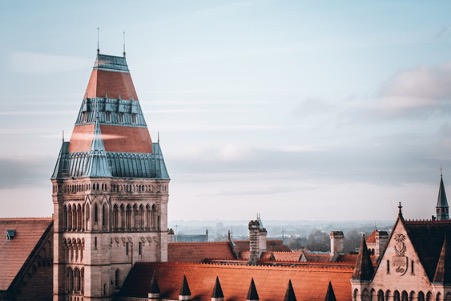[中文版]
Name
Centre for Digital Humanities, Cultures and Media
Short Description
The Centre of Digital Humanities, Cultures and Media at the University of Manchester, previously known as the Centre for Digital Humanities (DH@Manchester), is one of the UK’s largest hubs for humanities scholars. Drawing on Manchester’s rich cultural and technological heritage, the centre fosters innovative collaborations between computational sciences and humanities disciplines. It employs advanced digital methods and technologies to address cutting-edge research at the intersection of digital technology, society, and culture. Key areas of focus include spatial humanities, digital media, humanities data visualisation, gender and sexuality studies, critical algorithm studies, platform studies, digital visual culture and art, and heritage digitisation.(Source: University of Manchester, nd)
Teaching on DH
The Centre offers a variety of Digital Humanities (DH) courses. Since September 2019, it has provided an undergraduate minor program in DH, teaching digital methods such as mapping, text mining, and data visualization to explore how digital media and technology shape our lives and future. This program allows undergraduate students on single honours degrees to choose a Minor in Digital Humanities. Upon completing two DH course units, students will receive a Certificate in Digital Humanities. The program is designed to help students develop new skills, integrating technical expertise, creativity, and critical thinking—essential abilities for success in the workplace.
In 2025, the school will welcome its first cohort of BA Digital Media, Culture, and Society students. This program is designed to foster a historical and global understanding of digital technology while developing the digital skills necessary to address major challenges in media. Additionally, the Centre offers a Master’s degree in Digital Media, Culture, and Society, which equips students with the skills and knowledge to critically engage with key debates and issues in the study of digital media and technology.(Source: University of Manchester, nd).
Key Profiles
Dr Giulia Grisot, Lecturer in Digital Humanities. She specialises in the investigation of cultures and identities in literary and non-literary texts, using NLP and machine learning to examine represented space and encoded sentiments.
Dr Sam Hind, Lecturer in Digital Media and Culture and Programme Director of the MA in Digital Media, Culture and Society. His research interests include digital navigation, machine vision, algorithmic decision-making, platform (auto)mobility, and mobile play. Whereas, his expertise lies at the intersection of media studies, science and technology studies (STS), and digital geographies.
Dr Ashley Mattheis, Lecturer in Digital Media and Culture. Her expertise lies at the intersection of critical media studies, visual rhetorical criticism, and digital cultural analyses through the lens of feminist STS and Black feminist theories.
Dr Claire Reddleman, Lecturer in Digital Humanities (Contemporary Art and Digital Culture). Her research and creative interests are in maps, contemporary art, photography and digital collage, surveillance, and the critique of capitalism
Dr Luca Scholz, Senior Lecturer in Digital Humanities.His research is concerned with analysing and questioning data in historical and humanistic inquiry. He combines archival research, computational methods, and visualisation to study spatial history, intellectual history, and the representation of weather and climate.
Dr Łukasz Szulc, Senior Lecturer in Digital Media and Culture, and Programme Director of the BA in Digital Media, Culture and Society. He specialises in critical and cultural studies of digital media at the intersections of gender, sexuality and transnationalism, with a particular focus on Central and Eastern Europe, especially Poland.
Dr Joanna Taylor, Lecturer in Nineteenth-Century Literature and Digital Humanities, based in the department of English Literature, American Studies, and Creative Writing. Her research bridges the frontier between literary studies, digital and environmental humanities research.
Dr Shuaishuai Wang, Lecturer in Digital Media and Culture. His research lies at the intersection of platform studies, critical algorithm studies, digital economy, and queer media.
Image credit: University of Manchester, nd

Image credit: Shields, 2022
曼彻斯特大学数字人文中心
名称
曼彻斯特大学数字人文中心(DH@Manchester)
简要描述
曼彻斯特大学的数字人文学科、文化与媒体中心(前身为数字人文学科中心 DH@Manchester)是英国最大的数字人文学者聚集地之一。该中心依托曼彻斯特丰富的文化和技术遗产,推动计算科学与人文学科的创新合作。通过运用先进的数字方法和技术,中心致力于在数字技术、社会与文化交汇的前沿领域开展研究。研究的重点领域包括空间人文学科、数字媒体、人文学科数据可视化、性别与性研究、算法批判研究、平台研究、数字视觉文化与艺术以及遗产数字化等。
(资料来源: 曼彻斯特大学,未提供日期)
数字人文教学
该中心提供多种数字人文学科(DH)课程。自2019年9月起,中心开设了数字人文学科本科辅修课程,教授数字方法,如地图绘制、文本挖掘和数据可视化,帮助学生探索数字媒体和技术如何塑造我们的生活和未来。该课程允许单一荣誉学位的本科生选择数字人文学科辅修,完成两门数字人文学科课程单元后,学生将获得数字人文学科证书。该课程旨在帮助学生发展新技能,结合技术专长、创造力和批判性思维——这些都是在职场中取得成功的关键能力。
2025年,学校将迎来第一批数字媒体、文化与社会(BA Digital Media, Culture, and Society)本科生。该课程旨在培养学生对数字技术的历史性和全球性理解,并发展解决媒体领域重大挑战所需的数字技能。此外,中心还提供数字媒体、文化与社会(Digital Media, Culture, and Society)硕士学位课程,帮助学生掌握技能和知识,批判性地参与数字媒体与技术研究中的关键辩论和问题。
(资料来源: 曼彻斯特大学,未提供日期)。
关键学者
Giulia Grisot博士,数字人文学科讲师。她专注于通过自然语言处理(NLP)和机器学习技术,研究文学和非文学文本中的文化与身份,分析所呈现的空间和编码的情感。
Sam Hind博士,数字媒体与文化讲师,以及数字媒体、文化与社会硕士课程主任。他的研究兴趣包括数字导航、机器视觉、算法决策、平台(自动)移动性和移动游戏。他的专长位于媒体研究、科学与技术研究(STS)以及数字地理学的交汇点。
Ashley Mattheis博士,数字媒体与文化讲师。她的专长位于批判性媒体研究、视觉修辞批评和数字文化分析的交汇点,通过女性主义科学与技术研究(STS)和黑人女性主义理论的视角进行探讨。
Dr Claire Reddleman博士, 数字人文学科讲师(当代艺术与数字文化)。她的研究和创作兴趣包括地图、当代艺术、摄影与数字拼贴、监视以及对资本主义的批判。
Luca Scholz博士, 数字人文学科高级讲师。他的研究关注于在历史和人文学科研究中分析和质疑数据。他结合档案研究、计算方法和可视化技术,研究空间历史、思想史以及天气和气候的呈现。
Łukasz Szulc博士, 数字媒体与文化高级讲师,以及数字媒体、文化与社会本科课程主任。他专注于数字媒体的批判性和文化研究,研究性别、性取向和跨国主义的交汇点,特别关注中东欧,尤其是波兰。
Joanne Taylor博士,十九世纪文学与数字人文学科讲师,隶属于英语文学、美国研究与创意写作系。她的研究跨越了传统文学与数字人文学科的前沿,探索两者的交集。
Shuaishuai Wang博士,数字媒体与文化讲师。他的研究位于平台研究、批判性算法研究、数字经济和酷儿媒体的交汇点。
图像来源: 曼彻斯特大学, 未提供日期
